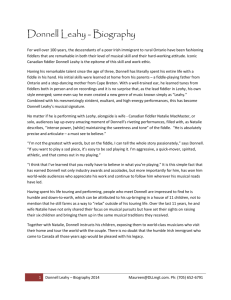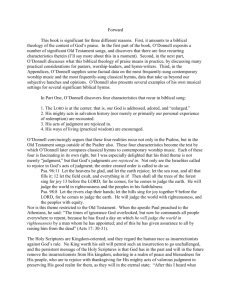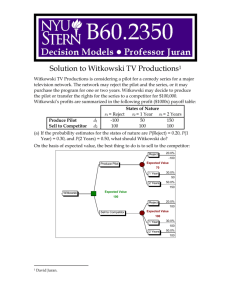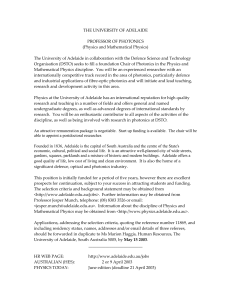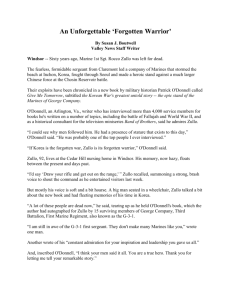DONNELL Kevin George
advertisement
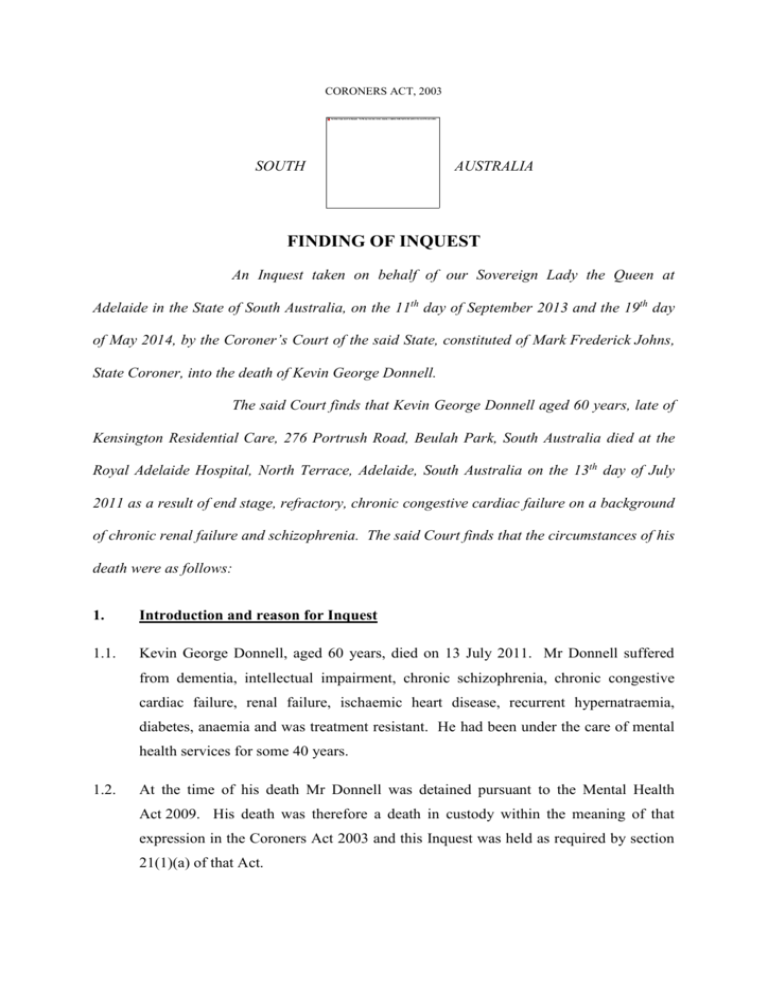
CORONERS ACT, 2003 SOUTH AUSTRALIA FINDING OF INQUEST An Inquest taken on behalf of our Sovereign Lady the Queen at Adelaide in the State of South Australia, on the 11th day of September 2013 and the 19th day of May 2014, by the Coroner’s Court of the said State, constituted of Mark Frederick Johns, State Coroner, into the death of Kevin George Donnell. The said Court finds that Kevin George Donnell aged 60 years, late of Kensington Residential Care, 276 Portrush Road, Beulah Park, South Australia died at the Royal Adelaide Hospital, North Terrace, Adelaide, South Australia on the 13th day of July 2011 as a result of end stage, refractory, chronic congestive cardiac failure on a background of chronic renal failure and schizophrenia. The said Court finds that the circumstances of his death were as follows: 1. Introduction and reason for Inquest 1.1. Kevin George Donnell, aged 60 years, died on 13 July 2011. Mr Donnell suffered from dementia, intellectual impairment, chronic schizophrenia, chronic congestive cardiac failure, renal failure, ischaemic heart disease, recurrent hypernatraemia, diabetes, anaemia and was treatment resistant. He had been under the care of mental health services for some 40 years. 1.2. At the time of his death Mr Donnell was detained pursuant to the Mental Health Act 2009. His death was therefore a death in custody within the meaning of that expression in the Coroners Act 2003 and this Inquest was held as required by section 21(1)(a) of that Act. 2 2. Background 2.1. Mr Donnell was usually a resident of the Kensington Residential Care Facility at Beulah Park. In the twelve months or more preceding his death Mr Donnell’s schizophrenia was characterised by disinhibited behaviour, often sexually explicit, delusional ideas, poor self care including urinary and faecal incontinence with inappropriate toileting and at times aggressive or violent behaviour towards people. 3. Mr Donnell’s admission history and detention order 3.1. On 25 May 2011 he was transferred to the Royal Adelaide Hospital due to uncontrollable behaviour including acts of violence towards staff at the facility. It was clear that Mr Donnell’s physical health was failing. 3.2. Upon his arrival at the Royal Adelaide Hospital Mr Donnell was noted to be confused, unable to look after himself, had poor insight and judgment, was wandering purposelessly and considered to be a risk to himself. He had an admission diagnosis of treatment resistant schizophrenia and end stage heart failure. 3.3. Given his unpredictable behaviour he was placed on a level one detention and treatment order shortly after admission. This was confirmed on 26 May 2011 and due to expire on 1 June 2011. 3.4. On 1 June 2011 Mr Donnell was examined and a level two detention and treatment order was implemented with an expiry of 13 July 2011 at 2pm. 3.5. In the twelve months preceding his death Mr Donnell had had at least eleven admissions to the Royal Adelaide Hospital either for his schizophrenia and associated behaviour, or his hypernatraemia, the fluid overload secondary to him exceeding the fluid restrictions that were placed upon him. 3.6. The final separation summary for Mr Donnell’s last admission to the Royal Adelaide Hospital perhaps best sums up his condition and treatment whilst hospitalised: 'That Mr Donnell, a 60 year-old gentleman from supported accommodation was admitted to the Royal Adelaide Hospital with increasing symptoms of chronic cardiac failure. This occurs on a background of ischemic heart disease and extremely impaired left ventricular function with an ejection fraction of only18%. During the admission Mr Donnell’s heart failure proved refractory to attempts to dieresis. His psychogenic polydipsia also compromised his ability to comply with fluid 3 restriction at times. Mr Donnell also suffered multiple exacerbations of pulmonary oedema. Dieresis was limited by recurrent hypernatraemia, with associated impairment of consciousness. Mr Donnell was reviewed by psychiatry during his admission and was placed under a detention order due to his poorly controlled schizophrenia. Given the refractory nature of Mr Donnell’s symptoms, family and medical staff decided that palliation of symptoms was most appropriate and that Mr Donnell would not be for escalation of therapy. Mr Donnell passed away on 13 July 2011 in the early hours of the morning, likely due to a cardiac arrhythmia.' 1 3.7. As early in the admission as 31 May 2011 it was agreed between Mr Donnell’s legal guardians and his treating doctors that he would not be for CPR, ICU or ventilation; that he was for MET calls, but not for code blues, and not for cardiac monitoring. This was confirmed on 21 June 2011 when it was apparent that his condition had significantly deteriorated and his prognosis was grave. 3.8. He died in his sleep at 4:40am on 13 July 2011. His death was certified at 5:34am. 4. Cause of death 4.1. Given his lengthy and clearly documented medical history it was decided that a post mortem was not necessary and the cause of death could be readily ascertained. A pathology review2 was conducted and the cause of death given by Dr Iain McIntyre of Forensic Science SA, is end stage refractory chronic congestive cardiac failure on a background of chronic renal failure and schizophrenia, and I so find. 5. Conclusion 5.1. I find that Mr Donnell had a mental illness at all material times and that the orders for detention under the Mental Health Act 2009 were lawful and appropriate. 5.2. I am further satisfied that the medical treatment that was administered to Mr Donnell during the period of his hospitalisation at the Royal Adelaide Hospital was lawful, appropriate, humane and necessary. 1 2 Exhibit C16 Exhibit C3a 4 6. Recommendations 6.1. I have no recommendations to make in this matter. Key Words: Death in Custody; Natural Causes In witness whereof the said Coroner has hereunto set and subscribed his hand and Seal the 19th day of May, 2014. State Coroner Inquest Number 27/2013 (1105/2011)
